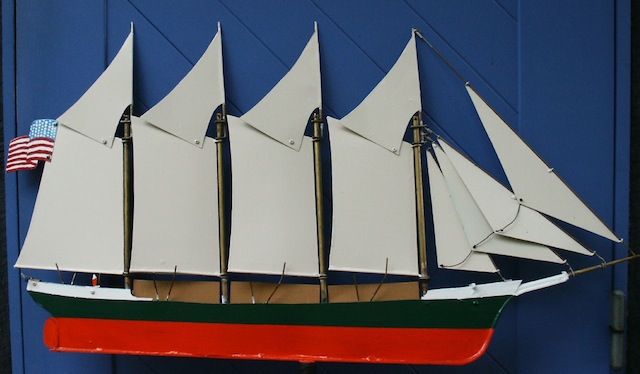 |
| Thompson steamboat. Leaving cove at Neck Point to attend the 9th annual Puget Sound Live Steamers Meet, McConnell Island, San Juan archipelago. Photo by Joanne (Patterson) Ridley©, 1979. |
 |
| Thomas Thompson at Shaw Island, steaming to the 1965 Puget Sound Live Steamers Meet, McConnell Island, WA. Photo by Jo Ann (Patterson) Ridley© |
The Tommy Thompson steamboat that some people called FIRE CANOE, was a well-known character in the San Juan Islands from 1949-1997; if not seen, we were often brought to attention by the sound of her beautiful whistle.
We are honored for these words from Thomas' brother Jack.
"My favorite story of my sister, Harriet, running Thomas’ steamboat is as follows. Thomas told this story:
One day Thomas had gone over to Friday Harbor to get a haircut and was sitting reading a magazine. Also, a few old-timers were sitting in the barbershop talking among themselves. They were commenting about his steamboat and didn’t know Thomas was the owner. Several days earlier Harriet had steamed into the public float near where the Coast Guard tied their vessel in Friday Harbor. She was in her usual summer clothes –short, short, Levis and her grey and black heavy knitted Indian sweater. She had her usual deep tan. She had an eagle feather stuck in one of her pigtails. One of the men said, “ Did you see that good looking babe running the steamboat. Man, I sure would like a date with her.” – Another of the men said, “Hey you better stay away from her. She’s related to one of the Haida chiefs. If you even THINK about her, that Haida chief will have your scalp (or other parts).” The men talked for another minute about her. Thomas just listened and related the story the following evening at dinner on McConnell Island.
We bought the surf boat at a war surplus for $400 and were going to the U of WA. It had a Buda four-cylinder gas engine in it. For two years it was run with the gas engine, then Thomas finished his rebuilding of the engine and built the boiler. When it was installed I sold the gas engine and the boat became Thomas’.
Incidentally, Thomas never called his steamboat the FIRE CANOE. Someone started calling it that, but Thomas and the family called it the Steamboat or the Boat.
Actually, Thomas got me and many other persons interested in steamboats. The poor old surf boat finally succumbed about 1999 to dry rot. His son has the engine. Thomas fired the steel boiler with beach wood. Obviously, the pipe boiler rusted out so, every several years, he would build a new boiler. The steam drum was of good steel and was always way over-strength, but he always replaced the new boiler entirely. I think he went through 5 or 6 boilers.
Incidentally, Thomas worked on the locomotives in Iran during WWII. The Army took over the railroad and hauled war supplies to the Russians. I believe the rail line was about 900-miles long and climbed over 2 or 3 passes of 7000 (?) feet. That must have been some real railroading!
I was on an Army operated railroad in France. After Antwerp was liberated I was in Belgium, then in Germany. Thomas and I had many letters back and forth about railroading.
Thomas was known pretty well through the US regarding steam locomotives and readily shared his knowledge with others, all over the country."
Above text by the late live steamer Jack Thompson, brother to Thomas.
For the Saltwater People Historical Society/March 2013





Nice Story.
ReplyDelete